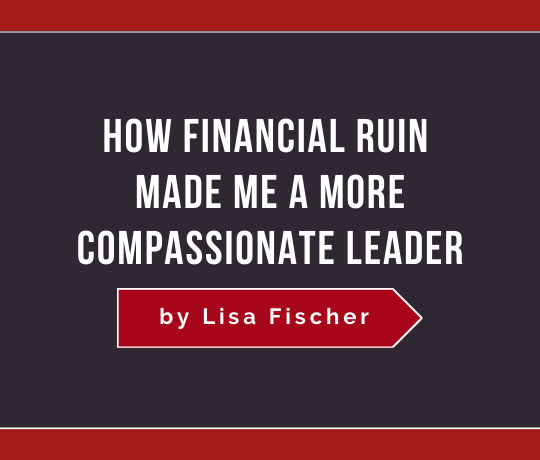Lisa Fischer had always known the importance of compassionate service, but her own struggle showed her just how far a little can go.
.png?width=400&height=400&name=Untitled%20design%20(66).png)
I have plenty of experience working with those struggling financially.
As the Chief Operating Officer at Mission Lane, I’ve counseled hundreds of unbanked and underbanked Americans, from those new to the country and without credit history to those recovering from tragedy.
Mission Lane works to revolutionize access to credit for millions of people like this, using innovative methods to understand our customer base and treat them with compassion.
However, nothing has taught me more about compassion than facing financial disaster myself.
About two months after my daughter was born, a debt collector called me about an unpaid credit card with a high balance. I was caught off guard because as far as I knew, my husband and I weren’t in debt and were paying everything off on time.
After spending some time talking to the debt collector, it became clear what had happened.
My husband had stolen my credit card and had been secretly accruing debt for years.
At that moment, my world crumbled around me. But through the haze of this painful memory, I can still recall the compassion that that collector showed me. She talked to me without judgment, speaking kindly as I pieced together what had happened. She was even able to delay some of my payments, giving me crucial time to determine my next move.
Unfortunately, that call was only the tip of the iceberg. I soon learned that my husband had a gambling addiction and had lost all of our money. He also hadn’t paid our taxes in five years, and our home had been foreclosed upon. I was forced to hire a forensic accountant to figure out how much I had to pay in taxes. Between the debt my husband had accrued, the costs of our unpaid taxes, and the expenses for divorce attorneys, I was in roughly eight hundred thousand dollars of debt.
So there I was – a Senior Vice President at a major US bank, with $150 in my account.
Despite having a good job with a strong salary, I was back at square one, while also adjusting to being a new mom.
Over the next decade, I had to completely rethink my finances, downsize my living situation, and implement a draconian budget that forced me to overhaul my lifestyle. This experience showed me a facet of what our clientele faces, allowing me to see that many of the financial products on the market aren’t accessible to a lot of Americans. And the products that are, are either low quality, or risk damaging their finances even more.
You don’t need to accrue a ton of debt or experience financial hardship to understand the importance of serving these populations with compassion. Perhaps you could volunteer with a credit counseling service or just listen in on some of the calls that come to your customer service team. However you do it, everyone should make an effort to understand those who have been shut out of America's credit system.
There’s no replacement for compassion and understanding.
This is clear to me over a decade later when I look back on my interaction with that first debt collector. She gave me the grace I needed to buy a little time to figure things out. She was not the last one to do so throughout that difficult time, and I remember every one of them. Each offered me a rung on the ladder out of debt, and that will continue to stick with me.
Through compassion, we can create loyal customers, help people overcome financial setbacks, and ultimately empower them to achieve their life goals - just like I did.
Hear stories like Lisa's live at Women in Consumer Finance 2025. We'll be in Charlotte, North Carolina from November 11 to 13. Get your ticket or sign up for updates here.



-Nov-07-2023-06-38-17-8684-PM.png)